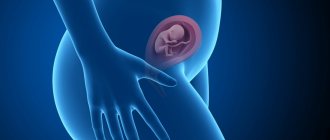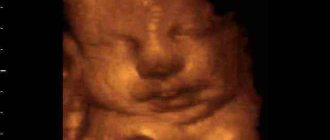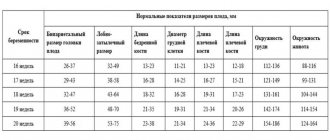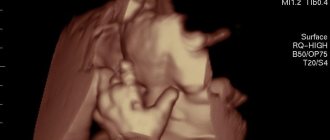23.08.2020 11488 0
The twelfth week of pregnancy is the end of the first trimester according to the obstetric period. In ten weeks of embryonic development, which are counted from the moment of conception, the child has made a huge leap from a fertilized cell to a practically formed human body. In the life of the expectant mother, there comes a time of peace and positivity, when the mood evens out and attacks of toxicosis recede.
Interesting Facts
| Options | Indications |
| Time from conception | 10 weeks |
| Period by month | 12 weeks |
| What month | 3 |
| Dimensions and weight of the fetus | 60-80 mm, 10-14 g |
| Uterus dimensions | In the pelvis, 12-13 cm in diameter |
Your baby is the size of
Kiwi
60-80mm Size
10-14 g Weight
Congratulations! You have passed the first milestone. You are 12 obstetric weeks pregnant. How much is this? You are in the 3rd month of gestation, the 2nd trimester begins. If you count the period from conception, then you have 10 weeks of gestation. What happens to mother and baby at this time? How does the fetus develop? What tests should a woman undergo? First things first.
Features of the 2nd trimester
The second trimester lasts from 12 to 24 embryonic weeks, or from 14 to 26 obstetric weeks. To avoid confusion, let us recall: the embryonic period of pregnancy begins from the day of conception, which, as is known, is possible only during the period of ovulation. For simplification, gynecologists and ultrasound programs use obstetric weeks, when the beginning of pregnancy is conventionally considered to be the 1st day of the last menstruation (i.e. 14 days earlier). The obstetric pregnancy calculator is only correct for women with a regular cycle of 28 days.
Normally, if toxicosis has subsided in the 2nd trimester, your health has improved, the fetus is developing and gradually gaining weight and height. Short-term tone of the uterus, slight swelling of the legs, mild nagging pain in the lower back, increased clear or whitish vaginal discharge, a slight decrease in blood pressure, decreased concentration, episodes of headaches - such changes in the body should not scare you. Hormonal changes have an effect; as the child grows, the uterus stretches, putting pressure on the internal organs, causing discomfort, increased urge to urinate, mild pain, and swelling.
Only from 16 to 20 embryonic (from 18 to 22 obstetric) weeks does the risk of late miscarriage increase, which is often associated with isthmic-cervical insufficiency (premature shortening of the cervix), sexually transmitted infections, placental abruption or placental previa (occlusion of the uterine pharynx). However, deterioration in health, nausea, severe swelling of the face and body, and high blood pressure may indicate the development of gestosis. It is also necessary to consult a doctor immediately in case of severely low blood pressure, bleeding, or hypertonicity of the uterus (manifested by sharp or prolonged pain and a feeling of heaviness in the lower abdomen).
From the middle of the trimester, itching often occurs, either localized or throughout the body. If it is not accompanied by a rash, a possible cause is stretching of the skin due to the increase in the woman’s shape or a reaction to an increase in estrogen in the body. However, sometimes itching occurs in response to allergens (household chemicals, food products, cosmetics) and stress, or due to liver dysfunction, bile stagnation, as well as infections and viruses (hepatitis, herpes, fungal skin diseases, etc.). Then it is necessary, if possible, to eliminate the cause: adjust nutrition, reduce emotional stress, and use medications prescribed by a doctor to increase the outflow of bile. In any case, a consultation with a gynecologist is necessary; self-medication during pregnancy is doubly dangerous.
Feelings of the expectant mother
The 1st trimester is ending, the most unpredictable and dangerous in terms of the risk of miscarriage. The baby has already “settled in” in the womb, and the expectant mother’s body has become accustomed to its new position. Most often, a woman at this stage of pregnancy feels good: the symptoms of toxicosis go away or have already disappeared, and emotional excitability has decreased.
What happens to a woman's body?
- The uterus has grown to 10 cm in width and has shifted somewhat into the abdominal cavity. Therefore, the urge to urinate becomes less frequent.
- Normal weight gain is 1.5-3 kg. The belly is not yet growing or growing slightly: it all depends on the general structure of the body and the number of pregnancies.
- A decrease in the amount of progesterone can affect the condition of the skin: dryness, flaking, acne.
- The first swelling may appear. Under the influence of hormones, the sodium content increases, which attracts fluid.
- The heart rate increases, which is associated with an increase in blood flow and increased load on the heart.
But there is also a nice bonus. Due to the high concentration of estrogen, the condition of the hair significantly improves: it becomes thicker and more voluminous.
Lifestyle of a pregnant woman

Correct diet.
The basis of the diet of the expectant mother should be formed by the principles of healthy eating. To maintain normal weight and provide energy to your body and your baby’s body, nutrition must be balanced in the content of all necessary vitamins, minerals and trace elements. A particularly important element for mother and baby is calcium, which is found in fermented milk products, dried fruits, and nuts. We must not forget about fresh vegetables and fruits, fish, lean meat and herbs. Train yourself to eat five small meals a day. A proper diet will help get rid of heartburn and reduce intestinal problems.
Vitamins and supplements.
The lack of certain vitamins during pregnancy is determined by the doctor based on characteristic signs. Most often, pregnant women are prescribed iron and folic acid supplements to prevent anemia.
Intimate life.
Sex has a beneficial effect on the psychological state of a pregnant woman and strengthens family relationships. Doctors fully support healthy intimate relationships, unless there are pathologies that threaten termination of pregnancy. The main condition should be mutual consent and comfort.

Physical exercise.
They have a beneficial effect on overall tone, saturate the blood with oxygen, help prepare for childbirth and quickly get back into shape after. The types of loads can be any, the main thing is that they become regular and bring pleasure. The most accessible type of physical activity is yoga. A properly selected set of exercises helps strengthen muscles, helps relieve stress on the spine and remove swelling. Swimming also does not require special training, but at the same time it forces almost all muscle groups to work.
The most difficult period of pregnancy is over. You can enjoy the changes that have occurred. Try to walk more, travel and get bright, pleasant impressions. This is a great time for parents to become aware of the upcoming changes.
(0 ratings; article rating 0)
Share Share Share
What does a fetus look like at 12 weeks?
The size of the baby at 12 weeks of pregnancy is up to 6-8 cm from crown to tailbone, its approximate weight is 10-14 grams. He is already actively moving, although the woman cannot yet feel it. Facial features and facial expressions are more clearly visible: the child opens and closes his mouth, closes his eyes. Its structure is still disproportionate, the head is much larger than the body.
All organs and systems are rapidly developing:
- the muscles of the larynx master swallowing movements;
- taste buds begin to function;
- sucking and grasping reflexes appear;
- the retina, lens and cornea of the eye are forming, but the baby’s eyelids are still completely covered;
- nail plates are formed, the first hair coat appears on the body - lanugo;
- The inner part of the ear is formed.
At week 12, the fetal genital organs are already formed, but during the first ultrasound you are unlikely to be told the gender of the unborn child due to the high risk of error. The baby is practicing breathing movements. The kidneys are already working, producing urine, which enters the bladder and is excreted into the amniotic fluid. Calling a baby an embryo at 12 weeks is incorrect. This is a full-fledged fruit.
What's happening
As before, at 11–12 weeks of pregnancy, the size of the fetal body is disproportionate and the head is still much larger than the rest of the body. The baby's eyes are covered with eyelids, and vellus hairs have appeared in place of eyelashes, eyebrows, on the upper lip and chin.
At the 12th week of pregnancy, a unique skin pattern (“imprint”) is formed on the pads of the fetal fingers. The intestines have taken their place and periodically contract, the kidneys produce urine, the liver secretes bile. The pituitary and thyroid glands produce hormones. In addition to red blood cells, leukocytes appear in the baby’s blood.
At this stage, the nervous system continues to develop, muscles become stronger, bone tissue matures, vocal cords and salivary glands begin to form.
The 12th week of pregnancy is the period when the maturation of the thymus gland is almost complete. This is one of the main organs of the immune system, responsible for the production of lymphocytes. And by the end of this week, the formation of the baby’s gender will be completed, and perhaps during the next ultrasound visit you will find out whether you are having a boy or a girl. True, this is not yet visible on a regular device. But equipment using 3D technology allows you to examine the fetus in more detail.
At 11–12 weeks of pregnancy, the baby’s weight is about 14 g, and the length from the tailbone to the crown is 6–9 cm. The baby is very active: he moves his arms and legs, tumbles, sucks his thumb, turns his head, reacts to external stimuli (vibrations, loud sounds, bright lights, etc.). But you still don’t feel his movements.
Tests and ultrasound
Now is the optimal time for testing for fetal pathologies, or first screening. It detects genetic abnormalities in development. Knowing about the condition of the fetus, the woman and the medical staff can specially prepare for the birth of a special baby, or the woman still has the opportunity to terminate the pregnancy at this stage.
How to do screening at 12 weeks of pregnancy
The woman takes a blood test for the hCG hormone and PAPP-A protein, then an ultrasound examination is performed. Laboratory data and ultrasound results are entered into a special program that calculates risks taking into account the age of the expectant mother, the number of pregnancies, lifestyle (whether she or the expectant father smokes), and concomitant diseases. As a result, you receive a form where the risks of various chromosomal disorders in the fetus are indicated in percentage terms. A gynecologist will help you decipher the data.
Recommendations
Continue to eat properly as you enter the 11th to 12th week of pregnancy. Eat often, but little by little, if possible, exclude sweets, fatty, smoked and fried foods; it is better to boil or steam foods. During pregnancy, you should not get carried away with vegetarianism, because the fetus vitally needs animal proteins, phosphorus and amino acids, which are not found in plant foods. 12 weeks of pregnancy is a good time to include meat, seafood, cereals, milk and dairy products, fresh vegetables, fruits and herbs in your diet. Be sure to drink plenty of fluids. Avoid alcohol: During this stage, your baby's brain continues to develop, and alcohol can cause irreparable damage to his nerve cells, even destroying some of them.
Keep your body clean during the 11th – 12th week of pregnancy. If you suffer from excessive sweating, shower as often as possible (you don't have to use soap every time). And due to increased vaginal discharge, pay special attention to genital hygiene. It is recommended to abandon regular toilet soap in favor of baby soap and switch to special gels for intimate areas.
Remember to take good care of your mouth. A child's skeletal system is built from calcium, which is taken from your body. Because of this, teeth suffer greatly. To keep them healthy, visit your dentist regularly.
The 12th week of pregnancy is the time to inform the employer about your situation: this will help to avoid misunderstandings in the future. When preparing for a conversation, think through all the nuances so that there is no misunderstanding between you and your superiors.
Possible complications
At the twelfth week, a woman may experience the following unpleasant symptoms.
Unusual vaginal discharge
Normally, they should be light, whitish, with a slight sour odor. Mucus, pus, blood clots are symptoms of an inflammatory process. Usually accompanied by itching or a burning sensation.
Pain in the lower back and pelvic area
Caused by stretching of the ligaments that hold the uterus, as well as congestion due to a sedentary lifestyle. If pain does not bother you constantly and disappears when you change position or after self-massage, do not worry. If they are intense and accompanied by unusual discharge, such as brown or pink, you should seek medical help.
Decreased immunity and high risk of ARVI
Susceptibility to colds during pregnancy is explained by a lack of vitamins against the background of toxicosis, iron deficiency, and disruption of sleep and rest patterns. To protect yourself from complications, get a flu shot, and during the epidemic season, spend less time in crowded places. If you have a high temperature, you should call your doctor and tell him about your situation, since not all anti-fever medications are safe during pregnancy.
Ultrasound at the twelfth week of pregnancy
During the period from the 11th to the 14th week, screening is carried out to identify chromosomal abnormalities and pathologies of fetal development. The examination includes a blood test from a vein and an ultrasound. Based on the screening results, the doctor makes a conclusion about the baby’s developmental state and the presence of pathologies. There are two visual markers of developmental anomalies: the thickness of the collar zone and the length of the nasal bones.

The doctor also evaluates the formation of the child’s internal organs, the thickness of the placenta and the features of its location. During the study, the heartbeat and motor activity are recorded and the main parameters of the fetus are measured.
- KTP - coccygeal-parietal size;
- BPR—bipariental, or transverse, head size;
- DBK - length of the femur;
- chest diameter;
- Head circumference;
- abdominal circumference.
At the twelfth week, on the monitor of the ultrasound machine you can see how the baby moves, yawns and grimaces. You can take the first photo of the baby.
The cervix, cervical canal and ovaries are checked for pathologies to eliminate the risk of miscarriage.
Do's and Don'ts
The twelfth week of pregnancy is a period when appetite significantly improves. But this does not mean that now you should start eating for two. Make sure your diet is balanced. It must include protein products: meat, fish, dairy products. The latter are also beneficial due to their high calcium content.
Include sources of vitamins and microelements in your menu: vegetables and fruits, legumes, nuts, various vegetable oils. This is the best prevention of constipation, which pregnant women are prone to.
Dangerous symptoms
It is believed that until the twelfth week, healthy children are born and the danger of miscarriage due to gross pathologies has already passed. Nevertheless, you should carefully monitor your condition.
Stomach ache.
They remain an alarming symptom. Hypertonicity of the uterus with pain in the rectal area may be a sign of a threatened miscarriage.
Bleeding.
Scarlet blood is the first sign of an incipient miscarriage. Call an ambulance immediately.
Brown discharge.
Abundant brown discharge accompanied by increasing abdominal pain indicates fetal rejection. This situation is dangerous for the development of inflammation and sepsis.
Checklist for 12 weeks of pregnancy
- If before the 12th week, flights could worsen the condition of the mother and fetus, then in the second trimester you can travel without fear.
- Start doing Kegel exercises to strengthen your pelvic floor muscles. This is an excellent prevention of involuntary urination during pregnancy and after childbirth.
Still have questions? You can always consult with specialists at the Women's Medical Center. We provide comprehensive pregnancy management and also perform 1 fetal screening based on the Delfia-LifeCycle system, the accuracy of which is 98%.










